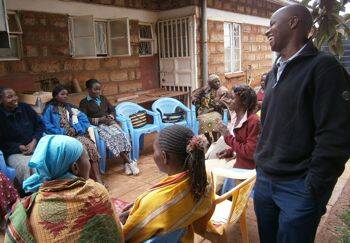When Alice Khakame knew she was pregnant again, she set off to get blood tests at the government maternity clinic where she lives in Kangemi, a poverty-ridden area of about 100,000 people on the outskirts of Nairobi.
Her husband had accompanied her for such tests in the past, but this time he refused to go. He was gone when she got back, before her blood tests showed she was HIV-positive.
"I think he knew what he had done and so he disappeared," she said. "And then I left the house, too, because of the stigma of the disease."
Pregnant and with her small son and daughter in tow, Khakame shifted from rented room to rented room on the other side of the slums, fearing she would die and avoiding telling anyone her husband had infected her with HIV, out of fear that her small family would be ostracized.
Without her day-laborer husband's salary, she soon fell into utter poverty and went untreated until a counselor from a local Catholic support group heard about her case.
"I was just hiding in the house, afraid, and then there was a lady who came from the church ... and she told me I would find people like me and I would share with them. And so I got to know that I am not alone."
Six years later, Khakame is surrounded by people with similar stories, all of them now being counseled and medically treated for HIV, and all of them working through a Catholic program called "Uzima."
"I am saving money, making beads out of paper for necklaces, here and at home," said Khakame, who uses the money for rent and the daily needs of her three children, none of whom contracted the disease.
"Uzima," or "life" in Swahili, one of Kenya's national languages, was founded by Kangemi's Jesuit-run Church of St. Joseph the Worker in 2004.
Using the Jesuit parish's facilities, the program now helps about 120 HIV-infected Kangemi residents, most of them women.
There are no exact figures for Kenyans living with HIV, but a 2012 U.S. Agency for International Development report on Kenya indicates women there are almost 50 percent more likely than men to contract the disease. AIDS activists say this can be due to many factors, including reluctance of men to be tested and the stigma surrounding HIV in the male-dominated society.
At the time of Uzima's inception, the stated goals were to provide support and cure to those infected and affected by HIV/AIDS, said the program's director, Jesuit Father Stephen Nzioki.
But he said those goals have evolved to include an emphasis on economic independence, thanks to new technologies and drugs that allow HIV-infected people to live full lives.
"At the beginning, the focus was on treating ... and helping those who were dying to do so peacefully," said Father Nzioki. "Now people are not dying. These people are healthy, so they need to do something to provide for their own lives and for their families," especially now, because of dwindling funds to HIV-related projects in Kenya.
"We have to think of ways to supplement," he said.
Until this year at least, Uzima has an annual budget of 4 million Kenyan shillings ($48,000) provided by the Irish Catholic charity, Trocaire.
The program employs two AIDS counselors and two social workers who create public awareness for HIV in Kangemi, assisted by Catholic families living there. Together, they locate HIV-infected residents and encourage them to seek antiretroviral treatment at public clinics.
The infected residents are counseled and offered membership in Uzima's support group, which offers training in handicraft production, gardening and poultry-rearing.
They ply their new trades alongside others on Jesuit parish facilities and put a monthly percentage of their earnings into a common bank account, from which they can then ask for interest-free loans to expand, said Emily Night, a Uzima social worker.
"As long as you have put in savings for at least six months, you can acquire a loan," she said. "And if you have savings of 1,000 shillings, you can borrow 3,000."
Everlyne Muchabi arrived at Uzima in 2007. She was poor, HIV-positive and raising five children alone. Her husband had died of an AIDS-related illness the year before.
She joined the support group and took classes in bead-making, after being counseled by Uzima staff to start antiretroviral treatments at a public clinic nearby.
"I got a loan for 10,000 shillings and bought materials to make more beads and to pay for school fees for my daughter and to pay for daily needs," said Muchabi.
Khakame, meanwhile, said she no longer wants her husband to come back. She said she has learned through Uzima's support group to create a new life for herself and her children, despite often unkind looks and taunts from many outside.
"They look at me and say that only HIV-positive people are making jewelry from paper, but I don't care," she said. "I meet with others like me at Uzima. We share our experiences. And then I go ... and make more jewelry."








